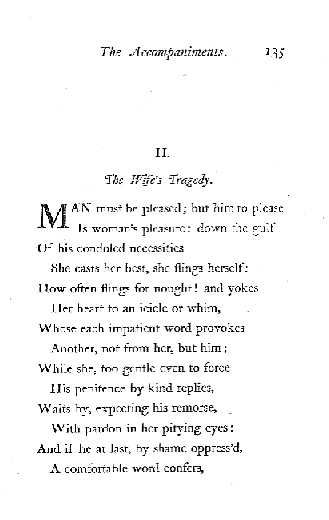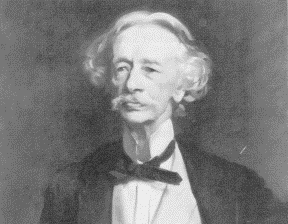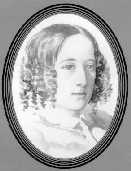
Man must be please; but him to please
Is woman's pleasure; down the gulf
Of his condoled necessities
She casts her best, she flings herself.
How often flings for nought, and yokes
Her heart to an icicle or whim,
Whose each impatient word provokes
Another, not from her, but him;
While she, too gentle even to force
His penitence by kind replies,
Waits by, expecting his remorse,
With pardon in her pitying eyes;
And if he once, by shame oppress'd,
A comfortable word confers,
She leans and weeps against his breast,
And seems to think the sin was hers;
Or any eye to see her charms,
At any time, she's still his wife,
Dearly devoted to his arms;
She loves with love that cannot tire;
And when, ah woe, she loves alone,
Through passionate duty love springs higher,
As grass grows taller round a stone.
-from Patmore's The Angel in the House

Patmore (pictured above) styled himself "the psychologist of love," and he
believed he had an exceptional ability to "discern sexual impurity and virginal
purity, the one as the tangible blackness and horror of hell, and the other
as the very blessed of heaven, and the flower and consummation of love between
man and woman." Throughout The Angel in the House, which grew
more popular as the 19th century progressed, the narrator interperses details
of his courtship and marriage with moral calls for woman's purity.
For example, immediately after a poem entitled "The Lover," in which the
narrator describes the "love-sick" and "lavish" passions of a young
man in pursuit of a "kiss" upon the "skirt" of a young woman, the narrator
upbraids a female prostitute for indulging in similar passions in a poem
entitled "Unthrift":
Ah, wasteful woman, she who may
On her sweet self set her own price
Knowing man cannot choose but pay
How has she cheapen'd paradise;
How given for nought her priceless gift,
How spoil'd the bread and spill'd the wine,
Which, spent with due, respective thrift,
Had made brutes men, and men divine
You might compare the language extoling female purity in this poem with the
language extolling male purity in some of the anti-masturbation texts of
this time. See Representations of Men.
You might also compare the representations of female prostitution with similiar
representations later in the Representations of Women section.
As a contrast to the image of the prostitute above, Patmore's wife, Emily
(pictured below), served as his idealization of purity and domesticity.

Return to Representations of Women


